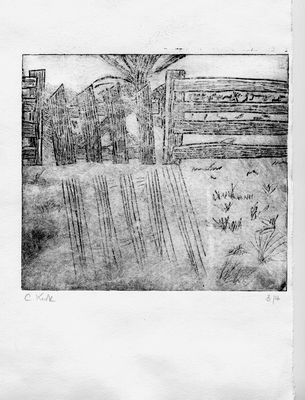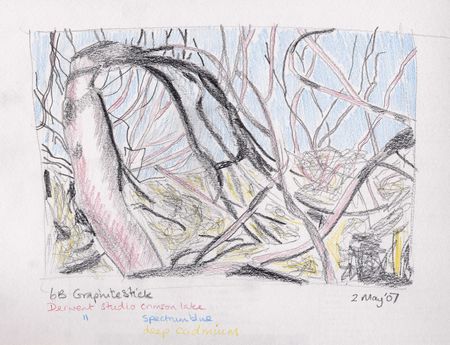I’ve spent much of last week on our end of year exhibition, which is being held in Todmorden Unitarian church. Whilst this is a rather unusual venue for an art exhibition, it has the advantage of being large enough to get everyone’s work into. It is a beautiful church, now no longer used for services. It is not the best venue to display paintings in, but it was a real celebration for everyone to have the opportunity to display their work. The private view on Friday evening had a real buzz, and the church was probably fuller than it has been in a long time.
Category Archives: Fractured Landscape
Final Piece
More work in progress
Spot the difference …
Unfortunately this is a rotten photo, which doesn’t help. I’ve still got more to do on this painting, but will leave it alone now until after the half-term break. It is extremely difficult trying to resolve an abstract painting!
Work in progress
This is taking a lot of my creative energy at the moment. It is my first ‘proper’ canvas (4ft by 3ft). This is a work in progress. I’m not happy with it yet – it needs more ‘life’. Problem is, I’m starting to get too careful with it, which is not what is needed at all!
Tree composition 2
Oil on wood.
I’ve been quiet here of late because I’ve been busier than usual with career coaching clients. However, I did find time yesterday to stretch my first canvas. This was my first adventure with a staple gun. Stretching a canvas is surprisingly hard work, and can take the skin off your knuckles. Still, I can paint over the bloodstains. 🙂
Drypoint etching

For this print, taken from one of my earlier sketches, I used a piece of intaglio printing card (it has a sort of shiny, plastic surface). Using the edge of a glue spatula (which was all I had to hand, but wasn’t an ideal tool) I carved the design into the card. I then scraped a thin layer of oil based intaglio printing ink across the whole plate and then blotted most of it off again with rags and torn pages from a yellow pages, leaving ink in the grooves and some ink on the surface of the card. The method of printing is the same as for collagraph i.e. soak a piece of heavyweight paper and then blot the excess water off it. Place a registration sheet on a piece of protective newspaper on the printing press. (The registration sheet is a template of the same size as the paper you will print on that marks out where you need to put the plate to ensure prints are positioned correctly. Sadly I didn’t use one for this as I was just testing the plate.) Lay the plate face up onto the registration sheet, place the damp paper over, lining up edges with the registration sheet, cover with newspaper and then the blankets and run through the press. Voila!
I learned that:
a) you need to leave quite a lot of ink on, and be careful not to rub it back out of the design; and
b) it is good to use a variety of cutting tools so that you get a variety of lines.
Tree composition 1
One of a series of oil paintings that I am developing for ‘Fractured Landscape’. This is based on the section from an earlier painting.
Tree abstract
Oil paint on mdf. Painted entirely using a plastic disposable knife. Based on a photo of part of a tree that had grown multiple shoots, creating lots of light and shadow.
A fragment of the same painting cropped using Paintshop Pro. I could happily use this as a starting point for another painting.
Burned Heather

Earlier this spring, the skies above the moors were full of thick plumes of smoke. Great patches of heather lay blackened where they had been burned. This is not some hideous act of vandalism, but is good land management practice. Burning off patches of moorland encourages new growth which the baby moorland birds like to eat; whilst keeping other areas untouched for the birds to safely nest in. This practice also keeps the heather from getting too overgrown, as it can become a serious fire hazard otherwise.
The picture is taken from a bird’s eye viewpoint, and drawn from a photo.
Journey to abstraction (or driven to distraction)
Continuing the fractured landscape project – these are A4 studies of small sections of the A1-size pieces that I did last week. The next stage is to play with different media/colour/size/formats.